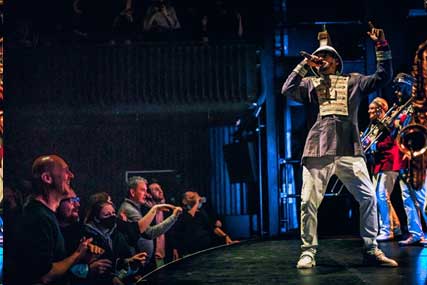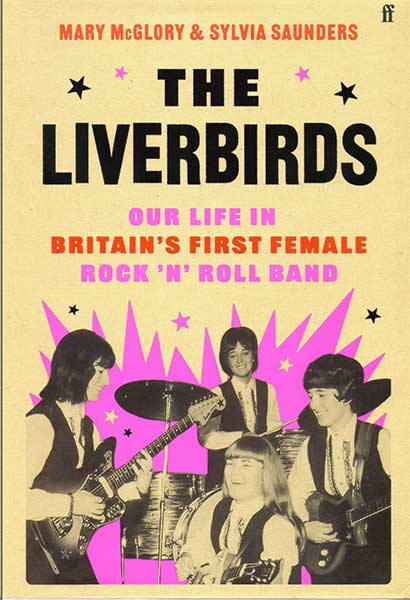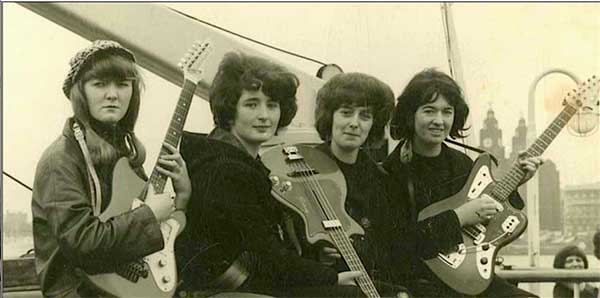THE OTHER FAB FOUR
Book Review of:
‘THE LIVERBIRDS: OUR LIFE IN
BRITAIN’S FIRST FEMALE ROCK ‘N’ ROLL BAND’
By Mary McGlory & Sylvia Saunders
(Faber & Faber Ltd) www.omnibuspress.com
ISBN 978-0-571-37702-2, Hardback, 306pp+8 colour plates

No, this book is not about the fondly remembered Nerys Hughes TV flat-share sitcom. These are different Liverbirds, a Merseybeat foursome more fab than most in that they defy John Lennon’s grumpy putdown that ‘girls don’t play guitars.’ Of course, that was long before John met Yoko, and got his sexual politics rearranged – ‘Woman Is The Nigger Of The World’ indeed. And these girls played guitars a damn sight better than most of their other-gendered contemporaries. Bassist Mary McGlory and drummer Sylvia Saunders – with vocalist-guitarists Valerie Gell and Pamela Birch broke the rules, played the Reeperbahn’s Star Club and scored a German no.5 hit with ‘Diddley Daddy’. You can hunt it out on YouTube, it still sounds sharp. Then they lyric-switched the Sir Douglas Quintet garage-classic into ‘He’s About A Mover’. If their material was mostly R&B covers, that was true of every other Beat Group around, and their take on the generic sound is hard and authentically rocking. As Joni Mitchell said, ‘when I heard, ‘You can’t do that, you’re a girl,’ I went ahead and did it anyway.’
For those who weren’t fortunate enough to be around at the time, it was 1963 that revolutionised the cosy world of Brit-Pop, when – virtually overnight, former teenage idols, Adam Faith, Eden Kane and Frank Ifield were rendered obsolete by a northern new wave eruption of Liverpool Beat Groups. First it was the Brian Epstein stable, the Beatles – obviously, but Gerry & The Pacemakers too, Billy J Kramer (his Dakotas were from Manchester), the Big Three and Fourmost. Then the Searchers, Swinging Blue Jeans and the Merseybeats. There was a gold rush of A&R agents, wrenched from their comfortable London offices and packed onto the north-bound train on a Liverpudlian signing spree. Even minor label, Oriole, issued an album ‘This Is Mersey Beat’ made up of also-rans, Faron’s Flamingos, Earl Preston & The TTs, Rory Storm & The Hurricanes (for whom Ringo Starr once drummed) and Sonny Webb & The Cascades. All of them big on the Liverpool circuit, but who never broke out nationally. They weren’t Rock bands. No-one spoke of them as bands – they were Pop Groups, or Beat Groups, or maybe Pop Combo’s. Bands were the big old-fashioned Swing Bands, like the Joe Loss Band, who lingered on at the local Locarno. While only the Liverbirds remained absent and unsigned. Soon, Manchester, London and Newcastle retaliated with top-line groups of their own. But briefly – during 1963, Liverpool, as Beat Poet Allen Ginsberg claimed, was ‘at the present moment the centre of the consciousness of the human universe.’

Mary McGlory and Sylvia Saunders alternate chapters to tell their collective tale, from post-war bombsite childhoods in the cosy community austerity of the Liverpool streets. Mary remembers ‘on the estate we would play in the street, tying ropes around the top of lampposts and using them to swing round and round before letting ourselves go, unravelling at speed’ while at school there was the grotesque ritual of ‘a grown man caning an eight-year-old girl.’ Her Dad served time in the nick for possessing items that ‘fell off the back of a lorry.’ While Sylvia grew up on a post-war Litherland housing estate. Among her other jobs, her Mum ‘cleaned telephone boxes, taking apart the receivers to wipe away the dust and grease’ while ‘my Dad would walk along the rail embankment with his brother, collecting coal that had fallen off the trains.’ There was no stigma. Everyone else they knew was in the same situation.
Mary’s brief vocation to be a Nun was discarded once she’d booked the Merseybeats to play the local youth club. Then she saw the Beatles at ‘The Cavern’ in December 1962, promptly bought guitars on hp from Hessy’s music store around the corner, formed an all-girl group named the Squaws, and blagged themselves a spot in Bill Harry’s ‘Mersey Beat’ tabloid. Priscilla White (Cilla Black) served non-alcoholic drinks and took your coat at ‘The Cavern’. Beryl Marsden sang with the Undertakers. But in Liverpool, says Sylvia, ‘everybody wanted to be in a band.’ She’d met Valerie Gell from Seaforth, and they started going to Ian & The Zodiacs gigs at ‘The Jive Hive’. Unlike the Squaws, Val could play guitar. Following up the ‘Mersey Beat’ feature, the duo tracked Mary down, just as Mary’s cousin Rita dropped out of the Squaws. But at Rita’s suggestion they name-switched to the Liverbirds, after the iconic metal fantasy birds perched atop the Royal Liver Building at Pier Head. Another of Mary’s cousin’s – Sheila McGlory stepped in to play rhythm. Two Catholics. Two Protestants. One friendship. By the end of 1962, their first gig was playing to pensioners at St Philly’s Church (St Philomena’s), but their third was at ‘The Cavern’, the first of six. And they played ‘Hava Nagila’ on ITVs regional news programme ‘Scene At 6:30’.
Honey Lantree drummed with the Honeycombs. Megan Davies played bass with the Applejacks. The fact that it was possible to draw attention to these two names was evidence of their uniqueness. Later there was Goldie & the Gingerbreads, who even scored a February 1965 no.25 chart single with ‘Can’t You hear My Heart Beat?’. While in far-off Detroit there was a young Suzi Quatro playing with the all-girl Pleasure Seekers. But girls were screamager Pop-fodder who bought the records and went into hysterical ecstasies as concert audiences. They had big pin-ups from ‘Rave’ or ‘Mirabelle’ on their bedroom walls, they mobbed the bands – like in ‘A Hard Day’s Night’. But girls didn’t play guitars. Girls who did were, as Sylvia says… ‘as rare as UFOs.’
When the Liverbirds played a November 1963 support spot to the up-&-coming Rolling Stones at the Nuneaton Co-op Ballroom, Mary broke a bass-string onstage. A chivalrous Bill Wyman not only loaned her his bass, but re-strung and re-tuned hers. The Stones also focussed them on harder, more R&B material. Irene Green joined as vocalist, but soon quit, went solo and renamed herself Tiffany. On the Rockin’ Berries recommendation she was replaced by a Newcastle girl called Heather. They got a new agent, and ‘headstrong and bossy’ Pamela ‘Pam’ Ann Birch replaced Shelia in the line-up on Kink Ray Davies suggestion.
Spring 1964, they audition for Brian Epstein – or at least for his right-hand man, Pete Brown, then demo ‘Reelin’ And Rockin’’ for Larry Page, with Jagger and Ian Stewart, Ray and Dave Davies in attendance, in time for their foray to Hamburg, playing ‘The Star Club’ alternating with sets by Beryl Marsden. And – in a sense, they never came back. The six-week trip extended to four years. The St Pauli area was a Red Light district with its own easy morality. ‘There was solidarity between the musicians, barmaids, sex workers and female fans’ Sylvia recalls, ‘a lot of drag queens, lesbians and trans people would go to the clubs in St Pauli because they felt accepted and protected.’
Although Pam was more knowing, for teenagers in the Red Light district, there was a degree of naiveté. When a groupie told them of giving a blowjob, they had to ask, ‘what is a blowjob?’ When told the ‘Star Club’ barmaids were lesbians, they had to ask ‘what is a lesbian?’ Then Sylvia loses her virginity in a one-nighter with Klaus Voorman, and Mary on her nineteenth birthday, 2 February 1965, finally ditching her long-term life-plan of becoming a Nun!

But they play so hard that club-owner Manfred Weissleder arranged other German dates for them. They played a show in Cold War divided Berlin, headlined by Chuck Berry. Warned in advance not to play any Chuck songs – which would have eliminated much of their set, they play them anyway – opening with ‘Roll Over Beethoven’, much to Chuck’s chagrin. But Pam wrote the B-side of their first single, issued in December 1964 – ‘Shop Around’ c/w ‘It’s Got To Be You’ (Star Club Records 148 508STF), as well as a song she’d written after an infatuation with the married Lee Curtis – ‘Leave All Your Loves In The Past’, flip of their cover of ‘Diddley Daddy’ (Star Club Records 148 526STF, April 1965) which actually made the German charts in a big way. Both sides were on their debut album ‘Star Club Show 4’ (Star Club Records 148 003STL) – thirteen songs recorded on a two-track machine across just two days, but ‘a snapshot of our energy at the time.’ Although not issued in the UK, Germany was a big record-buying market with a thriving Pop scene. There were American, Spanish and even Japanese editions. There’s TV footage of them doing Pam’s ‘Why Do You Hang Around Me’ which was B-side to third single ‘Peanut Butter’ (Star Club Records 148 528STF), and featured on second album ‘More Of The Liverbirds’ (1966, Star Club Records 158 021STY), recorded eight-track with overdubs.
They encounter a menagerie of eccentrics, from Paul ‘Gary Glitter’ Raven, Johnny Kidd (whose last record was one of Pam’s songs) to Freddie Starr. They tour with top German group the Rattles, and were charmed by Ben E King, and by Liverpool group the Chants – who had hits in the 1970s as the Real Thing. Mary rolled a joint for Jimi Hendrix. ‘The culture felt egalitarian’ says Mary, ‘there was nothing to hold women back.’
But by 1967 the music was changing, drugs were getting harder and mafia gangs were moving in to control the red-light district. Romantic complications were eroding the group’s sisterly solidarity. Mary was pregnant, then married Frank (who later wrote hits for Spanish Disco duo Baccara!). Val became full-time carer for Stephan following his auto-accident. They toured Japan with two stand-in members. Then split in August 1968. The ‘Star Club’ itself closed New Year’s Eve 1969. Perhaps if they’d early-returned to the UK, if they’d benefited from a Graham Gouldman or a Chris Andrews song – or one of their own compositions, the story might have been different. As it was, there were get-togethers and partial reunions. Val and Mary stayed in Germany. Pam’s younger sister Dyan Joan Birch sang lead on two hits by Arrival – ‘Friends’ (no.8 in January 1970) and ‘I Will Survive’ (no.16, June 1970). Pamela died 27 October 2009 unrepentant about her substance flirtations, with Valerie Gell succumbed to cancer on 11 December 2016. By then their collective story was being told on stage and now, in boofform.
A promoter almost signed them for American dates, until his proviso that they play Las Vegas clubs topless. They declined. If you think you know the 1960s, you don’t, not until you’ve read this book.
BY ANDREW DARLINGTON
.
